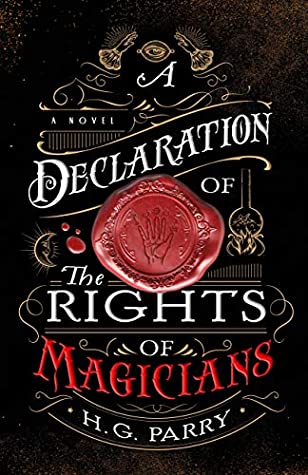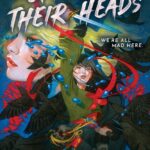
Genres: Historical Fantasy
Representation: Characters of Colour
Goodreads

It is the Age of Enlightenment -- of new and magical political movements, from the necromancer Robespierre calling for revolution in France to the weather mage Toussaint L'Ouverture leading the slaves of Haiti in their fight for freedom, to the bold new Prime Minister William Pitt weighing the legalization of magic among commoners in Britain and abolition throughout its colonies overseas.
But amidst all of the upheaval of the early modern world, there is an unknown force inciting all of human civilization into violent conflict. And it will require the combined efforts of revolutionaries, magicians, and abolitionists to unmask this hidden enemy before the whole world falls to darkness and chaos.
I’ve seen this book getting a lot of comparisons to Jonathan Strange & Mr Norrell, which I think is a little unfair; JS&MR has a kind of intrinsic light-heartedness to it, even when things get very serious indeed, and a sly wryness that invites the reader in on a joke the characters themselves are not in on. It’s big and fun and warm.
A Declaration of the Rights of Magicians (say that ten times fast) is a thoroughly brilliant masterpiece of historical fantasy, and it shouldn’t be getting compared to anything. It stands squarely on its own, rich and complex and utterly delicious – but tackling head-on the indescribable horrors of slavery, the poisoned ideals of the French Revolution, and the disgusting hypocrisy of those in power – including those who consider themselves good men.
How to describe it in a way that does it justice?
I can’t speak to its historical accuracy – this isn’t a period of history I’m familiar with – but Parry has used several important historical personages as characters, including William Pitt, William Wilberforce, and Maximilien Robespierre – the Prime Minister of ‘Great’ Britain, a famous abolitionist, and one of the guiding powers of the French Revolution, respectively. Although there is one other POV character, these three form the holy trinity of the novel, for the most part.
Like I said, I knew next to nothing about these people or this time period going into A Declaration of the Rights of Magicians. But Parry very much brought both the personages and time to life for me in these pages.
In this reimagined history, magic is very real, a gift passed through bloodlines. However, in Europe at least, society is divided into Aristocrats and Commoners – and Commoners are forbidden from using any magic they might have. Although everyone is tested for magic at birth, some people’s gifts don’t manifest until later, and being an unregistered magician gets you even more time in the Tower of London than performing illegal magic. The laws are enforced by the enchanted bracelets all Commoners must wear, which burn if the wearer uses any kind of magic, and alert the Knights Templar, which are still around as a kind of magic police, although their power and influence is very much waned from what it once was.
Pretty much instantly the pointlessness of this system is driven home to the reader, for as we’re introduced to a young Pitt, we learn that his family were only raised to Aristocrats one generation prior, when his father joined the House of Commoners (for those of you not raised in the UK, that’s a slight tweak to the real-world House of Commons, one half of the British parliament – the other being the House of Lords, which has the same name in Parry’s world) and thereby became a Lord. (Don’t even try to make sense of the nonsense that is having Lords in the House of Commons/Commoners, okay?) It’s clear, then, that there is no actual difference between Aristocrats and Commoners, not when it’s so easy to cross the line that divides them. It’s an arbitrary divide that’s about nothing but power, oppression, and classism.
The book traces the rises to power of Pitt, who goes from lawyer to Prime Minister, and Robespierre – also a lawyer, but one overcome with a vision of what France could be, if only *gestures vaguely* were gotten rid of. Wilberforce goes from Pitt’s post-university friend to a political power in his own right, though his friendship with Pitt remains central to the story. And then there’s Fina, who is on the peripheral in a way that seems pointed and deliberate: she’s a slave, taken from Africa at such a young age she doesn’t remember her birthname, and put to work on a plantation in British-owned Jamaica.
It seems necessary to mention that Parry has found a way to make slavery even more horrific than it was/is already: in this version of the 18th century, slaves are force-fed potions that leave them unable to control their own bodies at all. This is driven home almost right away when Fina, right after being taken off the ship, is branded; apparently the branding serves to test whether anyone is resistant to the potions, since those who are completely under its sway can’t even scream when the slavers use the hot irons.
Yeah. Not only have they had their freedom stripped away, but even their physical autonomy is stolen from them. Let that sink in for a minute.
Parry has framed the issue of slavery in what I think is a really clever way; Fina is the POV character with the fewest chapters, sidelining her in the way that 18th century Britain sidelines slavery – out of sight, out of mind. But Fina’s story runs beneath all the others in the book, just as slavery is the foundation – or at least part of the foundation – of Europe at this point; a mostly-invisible but incredibly powerful undercurrent, a rotten leg of the pedestal Britain in particular has built for itself. And that pedestal is going to come down.
Not least because there are abolitionists in England campaigning as hard as they can to have the slave trade brought to an end. Wilberforce, in time, becomes one of the driving forces of the movement, bringing the issue to parliament again and again and again over the course of the book. However, just as in real-world history, these attempts fail every time, and I think it’s worth placing those two storylines side-by-side: the abolitionist movement in England/Britain, and Fina’s story, entwined as it is with slave uprisings and resistance. On the one side, we have well-meaning white people taking the slow, peaceful, legal route to try and overturn this evil; and on the other, we have real human suffering, and the violence that runs rampant when the oppressed are finally able to fight back. Especially set in the context of, you know, the world right now, it feels like a pointed comparison.
Although Parry doesn’t seem to be praising one method over the other – merely presenting both to the reader in what felt like a very unbiased way – there’s definitely some things to be said about those who think they’re ‘good men’. And what really impressed me was that, although the narrative praises these men as capital g Good for holding to their higher principles, it still comes through loud and clear that they are Perhaps Not So Great.
There’s one particular example that stands out, and I’ll try and describe it for you with as few spoilers as possible: at one point, it comes out that one member of the House of Commoners could, using mesmerism (a form of mind-control magic), sway the votes needed to pass the bill that would abolish slavery. And he doesn’t do it, because That Would Be Wrong. Free will is sacred, isn’t it?
Bull. Shit. It’s the rankest hypocrisy: hundreds of thousands, maybe millions, of slaves don’t have their freedom or their bodily autonomy – what about their free will? How can you seriously stand there, and stand proud, and say that mind-controlling a handful of people for a few minutes is an unacceptable cost to set those slaves free? How can you seriously compare those two situations, and say they’re equally unethical? They’re not. They’re not even close. And it’s the worst kind of White People Liberalism TM to say that they are.
And what’s brilliant is that Parry doesn’t come out and say that straight to your face. The condemnation isn’t at all heavy-handed; it’s scattered in little seeds throughout the book, seeds that can’t help but sprout in your mind as you read.
And like – I’ve spent hours pondering the authorial choices that made Parry give that particular magic to that particular character, and how subtle and clever and deliberate those choices were. How Parry uses that to frame this character in this specific way. Parry didn’t have to do that; could have given that magic to another character, or not brought it into play at all. So placing it into the story as exactly as it was done…
That, I think, is maybe what impresses me most of all: although the fantasy aspect of the novel at first looks kind of simplistic, Parry wields every bit of it like a surgeon’s scalpel, or a sculptor’s hammer. Despite the book’s length, nothing feels bloated or padded-out; every word is blazingly potent, every detail a vital tile in the mosaic that makes up the whole story. It’s an absolute masterpiece of the writer’s craft, and the more I linger over it, the more in awe I am.
This isn’t a quick adventure story; look elsewhere, if that’s what you’re in the mood for right now. And I’ve spent a lot of time talking about slavery, but there’s a lot more to A Declaration of the Rights of Magicians (readers as sensitive as I will be relieved to know that very little of the violence is what I’d consider graphic). It’s about politics and power, classism and ideals, equality and ethical questions with no easy answers. It’s about the evils we get so used to we don’t question them anymore; it’s about whether the ends justify the means, and whether justice should take a backseat to practicality. It’s about how often fighting the good fight is a long, slow, miserable process with many set-backs, and how long will you keep slogging away for the sake of what’s right?
This is the book, folx. You do not want to miss it.
I cannot wait for the sequel.






I’m hoping to find time to read this, excellent review:-)
Thank you! And I really hope you get the chance, I’d love to see your thoughts!